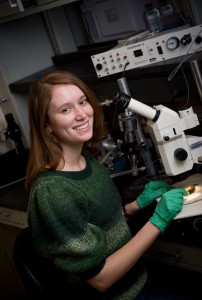March 2010 Scientist of the Month: Nicole Neubarth
by Heather King
 Nicole Neubarth, a third year undergraduate at the University of Chicago, has a lot on her plate. She works part time in Dr. Melina Hale’s lab as an undergraduate research assistant. She also takes a full load of biology and core curriculum courses, volunteers for the university’s film society, and is a fellow in the Computational NeuroscienceResearch Training Program, funded by the National Institute of Drug Abuse at NIH. Despite the time she spends on these activities, she maintains her enthusiasm for biology and research.
Nicole Neubarth, a third year undergraduate at the University of Chicago, has a lot on her plate. She works part time in Dr. Melina Hale’s lab as an undergraduate research assistant. She also takes a full load of biology and core curriculum courses, volunteers for the university’s film society, and is a fellow in the Computational NeuroscienceResearch Training Program, funded by the National Institute of Drug Abuse at NIH. Despite the time she spends on these activities, she maintains her enthusiasm for biology and research.
“My interest in biology came from my fascination with animals,” Nicole says. “There wasn’t a particular moment that I became interested in biology, it was just what came naturally to me.” Nicole, like many future biologists, spent her childhood catching insects and fish in containers to see what they would eat and where they would hide. As a high school student, she became interested in neuroscience by reading popular science articles and, in particular, an article about the evolution of morality in primates caught her eye. She saw neuroscience as the study of the ‘black boxes’ between the brain and a behavior, and wanted to understand their components. “To study these inner components would be like going back in time,” explains Nicole, “or even understanding what it’s like to be another organism, or having a better understanding of my fellow humans.”
Primate researched piqued her interest, but Nicole chose to work with Dr. Melina Hale studying locomotion in fish. While moral behavior was very interesting to Nicole, she realized that such complex behaviors were challenging to quantify. Locomotion in fish is a much simpler system, and provides the opportunity to make direct connections between a particular behavior and its corresponding neuron or neurological pathway. Her current project, with Dr. Hale and collaborators George Lauder at Harvard University and James Tangorra at Drexel University, is aimed at understanding the mechanism fish use to sense changes in the surrounding environment. The group hopes to gain insight into the neurological pathways in the pectoral fins used to send information to the brain about the turbulence of the water, and the pathways the brain uses to respond and give instructions to the fins on how to respond to the turbulence. Using this information, they hope to build an autonomous swimming robot with the ability to correct for irregularities in the surrounding fluid.
Working in Dr. Hale’s lab also inspires Nicole as a female scientist. “Not only is Melina a respected scientist, she also has a family. I admire her ability to perform two very difficult jobs at once.” Nicole plans to earn a faculty position at a university, where she can continue to contribute to the field of neuroscience. We wish Nicole the best of luck in the pursuit of her goals!
Nomination and article submitted by AWIS Chicago Staff Writer Heather King. Ms. King is a PhD candidate at University of Chicago. Photograph courtesy of Yen-Chyi Liu.
*Know a scientist you think should be featured in an upcoming “Scientist of the Month” article? Send nominations to Jessica Reimer. Your nominee does not need to be an AWIS member or a woman, but should promote the advancement of women in science, technology, mathematics and engineering.
Want to keep yourself up-to-date on AWIS Chicago activities? Follow AWIS Chicago on Twitter! You can request to be added to our listserve by clicking here, and join the AWIS Chicago group on LinkedIn and Facebook by clicking the icons on the bottom right of this page.
